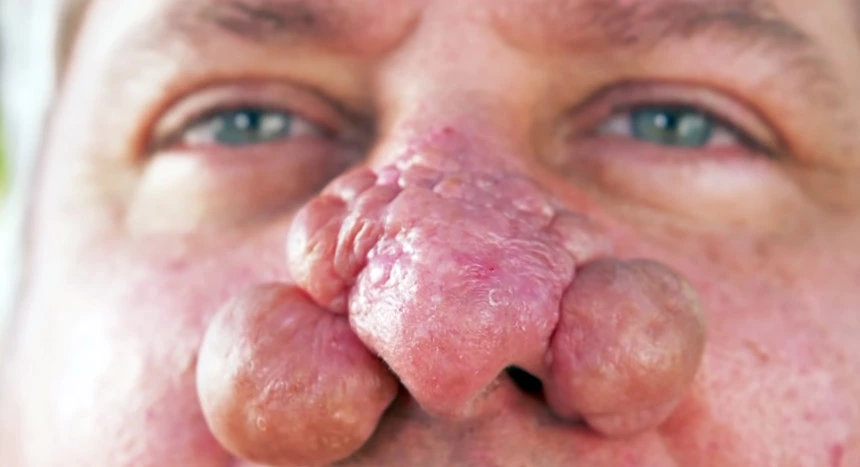Does Drinking Alcohol Cause Drinker’s Nose?
Table of Contents
- Does Drinking Alcohol Cause Drinker’s Nose?
- What is Rhinophyma?
- The Stigma Behind “Alcoholic Nose”
- Can Drinking Worsen Rhinophyma?
- Treating Rhinophyma
- Recognizing the Signs of Alcohol Abuse
- How is Alcohol Addiction Treated?
- Frequently Asked Questions About Alcoholic Nose:
- Find Addiction Treatment Programs Today!
When discussing the term “alcoholic nose,” this is actually referring to the skin condition rhinophyma. Under its official medical term, this condition falls under the category of rosacea, which causes individuals to have chronically inflamed skin.
Rosacea and rhinophyma, despite popular belief, do not have any direct correlation to alcohol use. While excessive alcohol consumption can lead to a number of health problems, a red and bumpy nose has, thus far, not been found to be one of these issues.
So while terms like “alcoholic nose” and “whiskey nose” may have a catchy ring to them, they are not accurate indicators of what causes severe rosacea or rhinophyma nose. With that being said, alcohol abuse can lead to several other health conditions, which may be worse than rhinophyma.
Keep reading to learn the realities behind the myth of a ‘drinker’s nose,’ and to find out how to get effective help if you are struggling with alcohol!
What is Rhinophyma?

Rhinophyma is a skin disorder mainly caused by enlarged blood vessels bursting under the skin’s surface. Symptoms of rhinophyma include inflammation, red bumps forming on the nose, and an overall more bulbous nose.
This redness and swelling are caused by broken blood vessels and sores usually found on or around the nose. Along with a red nose and nose growth, individuals suffering from rhinophyma may also get pus-filled bumps around their nasal area, which can further worsen their nose’s swollen appearance.
The bursting of blood vessels makes blood more visible under the skin, which is what causes redness. With more severe symptoms of rosacea, the cheeks and nose may even become purple, as well as more bulbous and disfigured. Individuals with these conditions may even experience a stinging sensation alongside rhinophyma and rosacea flare-ups.
Rosacea has four subgroups, with rhinophyma usually being considered the worst of them. It is a progressive and chronic skin condition that develops over the course of several years. Currently, rhinophyma is believed to be the result of leaving less severe rosacea symptoms untreated.
With that being said, not many people will go on to develop rhinophyma. Furthermore, while this chronic inflammation can be diagnosed in women, men are considered to be at a higher risk of developing rhinophyma. Individuals with fair skin or a family history of skin conditions may also be more likely to develop this skin disorder.
The Stigma Behind “Alcoholic Nose”
Unfortunately, many people who are struggling with this skin condition may have a hard time getting help, as they are subject to the outdated and unfounded stigma surrounding rhinophyma.
While “alcoholic nose” may seem like a funny nickname to others, it is downplaying a very serious medical condition that can already be difficult to deal with, without having to worry about other people’s opinions.
Because of how visible rhinophyma is, many people with this condition will struggle with self-confidence when it comes to their noses. Meeting new people or doing basic tasks outside their homes can fill them with the fear of being judged or ridiculed.
With many people still under the impression that “alcoholic nose” is a real thing, anyone with rhinophyma or a more severe form of rosacea can find themselves facing incorrect assumptions about their character and behaviors.
While, in reality, there is little to no evidence suggesting that there is any connection between substance abuse and rhinophyma. When treating rhinophyma, regular alcohol consumption and even binge drinking should not have any effect on this process.
Can Drinking Worsen Rhinophyma?

While it is true that when a person drinks this can cause their face to have a flushed appearance and, of course, make their nose red, this does not mean that it causes rosacea or rhinophyma. This is a skin condition that forms gradually and, currently, does not have an exact cause.
There are two common triggers that can cause people to experience redness after drinking too much alcohol: an enzyme deficiency or rosacea. Both of these causing factors may be related to a person’s ethnicity or genetics.
- Enzyme Deficiency: Many Asian populations have alcohol dehydrogenase deficiencies, which is the enzyme responsible for breaking alcohol down. When alcohol enters the cells in the blood vessels, they expand, causing flushing and redness in the face. This can also cause many people to feel warm or overheated when they are drinking.
- Rosacea: Fair-skinned individuals and those with Northern European ethnic backgrounds may be more likely to experience rosacea. While alcohol use will not cause rosacea, it can cause flare-ups. There are many common triggers that can cause a rosacea flare-up, including eating spicy foods, drinking hot drinks, stress, sunlight, and, of course, alcohol.
While many people can experience flushed skin after they drink alcohol, this does not mean that they have rosacea or rhinophyma, or even an ‘alcoholic nose.’ It is these beliefs that have led many individuals to suffer inaccurate judgments and assumptions about their character and substance use habits.
With that being said, if you have either of these skin conditions, your symptoms may be worsened if you consume alcohol. It is for this reason that limiting your alcohol use may be a good idea if you have a serious skin disorder, as it can lead to the appearance of what others term an alcoholic nose, as well as exacerbating existing skin conditions.
Treating Rhinophyma
If left untreated, rhinophyma can become a permanent issue. This is why it is important to seek advice from your healthcare providers on how to manage this condition as soon as you notice your symptoms. Currently, the two most common methods used for treating rosacea and rhinophyma are medications and surgery.
Medications Used to Treat Rhinophyma
Currently, there are no medications that can be used to fully reverse rhinophyma symptoms. However, there are some that can help manage these symptoms. Medications that are used to help treat and manage rhinophyma include:
- Topical and Oral Antibiotics. Medications such as sulfacetamide, minocycline, tetracycline, and others can all help to reduce inflamed and red skin.
- Topical Medications. Ointments such as Retin-A and Azelex can help with minimizing inflammation.
- Oral Medications. Oral medicines like isotretinoin can help prevent oil production in skin glands, which can help ease swelling and inflammation.
Surgery for Rhinophyma
While medication can help manage the symptoms of skin disorders like rosacea and rhinophyma, and help minimize what others perceive to be an ‘alcoholic nose,’ they may not be effective for long-term success. In more advanced cases, surgery will be the best course of treatment for rhinophyma.
Excess tissue and swelling of the skin on the nose are what mainly cause the disfigurement of this area for people with these conditions. When left untreated, this can become permanent. In these cases, rhinophyma surgery will be the individual’s best option. Some of the surgical procedures and treatments used for treating rhinophyma include:
- General surgeryuses a scalpel to remove excess tissue on the nose.
- Laser resurfacinguses a laser to target specific problem areas on the nose.
- Cryosurgerycan freeze and remove excess tissues on and around the nose.
- Dermabrasionremoves the top layer of skin on the nose by using a small, rotating device.
While surgery can be an effective form of treatment, the longer excess tissues have been left unmanaged, the more permanent they will become. If you are experiencing rhinophyma symptoms, you will need to seek out professional medical advice on how you should proceed with treating this condition.
Recognizing the Signs of Alcohol Abuse
While drinking alcohol may not cause rhinophyma, or lead directly to an ‘alcoholic nose,’ it can have several other negative consequences. For starters, drinking more alcohol than is recommended at once can lead to alcohol poisoning and reckless behavior, which can cause injury to yourself or others.
The National Institute on Alcohol Abuse and Alcoholism reports that around 17 million people have an alcohol use disorder throughout the US. This means that they are unable to stop drinking on their own, and their alcohol use has become problematic. At this point, various addiction treatmen measures can help to overcome issues and attain sobriety.
The Progression of Problem Drinking into Alcoholism
While it can be difficult to admit when you or a loved one may have a problem, it is important to know how to recognize the signs of alcohol addiction. One of the first indicators to look out for is if you have begun using alcohol as a coping mechanism, or as a mood enhancer. Your drinking may also be becoming a crutch for managing stress caused by your home, school, or work life, or other environmental factors.
With long-term alcohol abuse, you may also develop physical side effects, such as organ damage, heart conditions, and cognitive impairment. You may also develop a mental health condition, such as depression or anxiety.
Ultimately, one of the biggest signs that you have a drinking problem is if you are experiencing withdrawal symptoms upon trying to reduce or completely stop your alcohol intake. If you recognize any of these signs of addiction in yourself or a loved one, it is time to get help. Seeking out professional rehab programs can help you overcome addiction and get your life back on track, and help with concrete resources that address how to stop drinking alcohol.
How is Alcohol Addiction Treated?

Addiction is a very complex and personal disease, and the best approach for treating an alcohol use disorder will vary on a case-by-case basis. With that being said, there are several addiction treatment methods and programs that may be used to help those struggling with alcohol abuse overcome their issues and achieve sobriety. These include:
- Inpatient and residential rehab programs
- Outpatient treatment
- Dual diagnosis treatment
- Medication-assisted treatment
Which of these rehabilitation methods will be best suited to your recovery process will depend on several factors, including the severity of your addiction, as well as whether you have any other underlying/co-occurring mental health or medical disorders.
You can speak with a Find Addiction Rehabs representative today to discuss all of your treatment options, and find out which of these will be best suited for helping you overcome your alcohol abuse and achieve long-term sobriety.
Frequently Asked Questions About Alcoholic Nose:
Can Alcohol Change the Appearance of Your Nose?
No, an ‘alcoholic nose’ or ‘drinker’s nose’ can be caused by broken blood vessels, and the condition of rhinophyma, but is not associated with alcohol substance abuse. While drinking can be the underlying cause of many issues, it is not typically the source of a reddish or swollen nose.
Can Rhinophyma Be Reversed?
Unfortunately, there is currently no complete cure for rhinophyma. However, medications and surgical treatments can help manage and reduce the symptoms of this condition if they are started quickly enough. The longer this condition is left unaddressed, the more likely it will be to become permanent.
Find Addiction Treatment Programs Today!
If you or a loved one is struggling with an alcohol use disorder, help is available to get you back on a healthier, substance-free path. The Find Addiction Rehabs hotline is available 24/7 to help you find treatment programs nationwide that are affordable and effective for all of your recovery needs.
So make the confidential call now, and one of our representatives will help you take the first step on your path to sobriety today!
Anna M. joined Find Addiction Rehabs with extensive experience in the field of addiction treatment. As a former Nurse Practitioner in Miami, she found her passion for addiction treatment when a family member was lost to his disease. With each article and resource, she hopes to save other families from experiencing the anguish of a loved one’s passing due to drinking or drugs.


